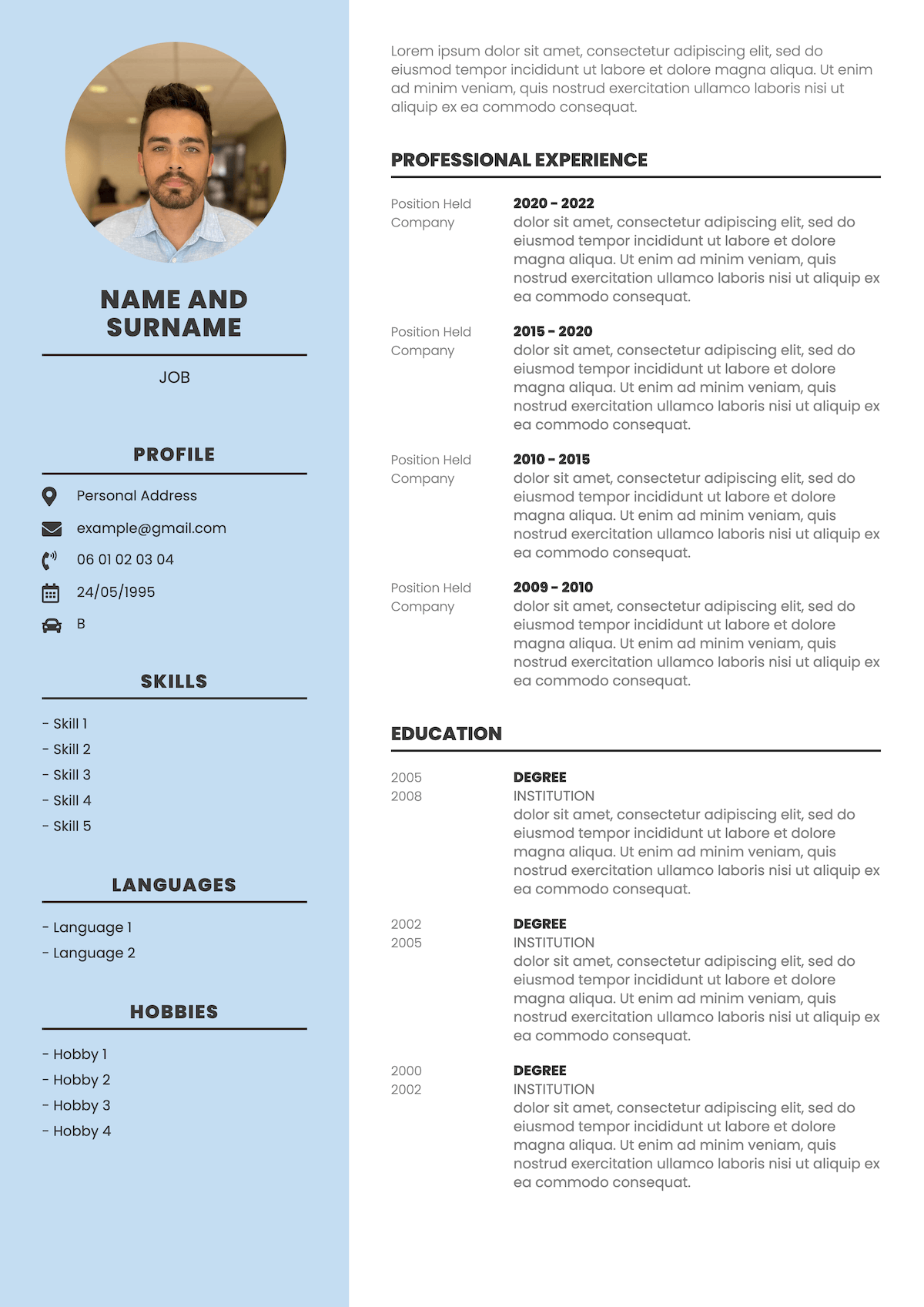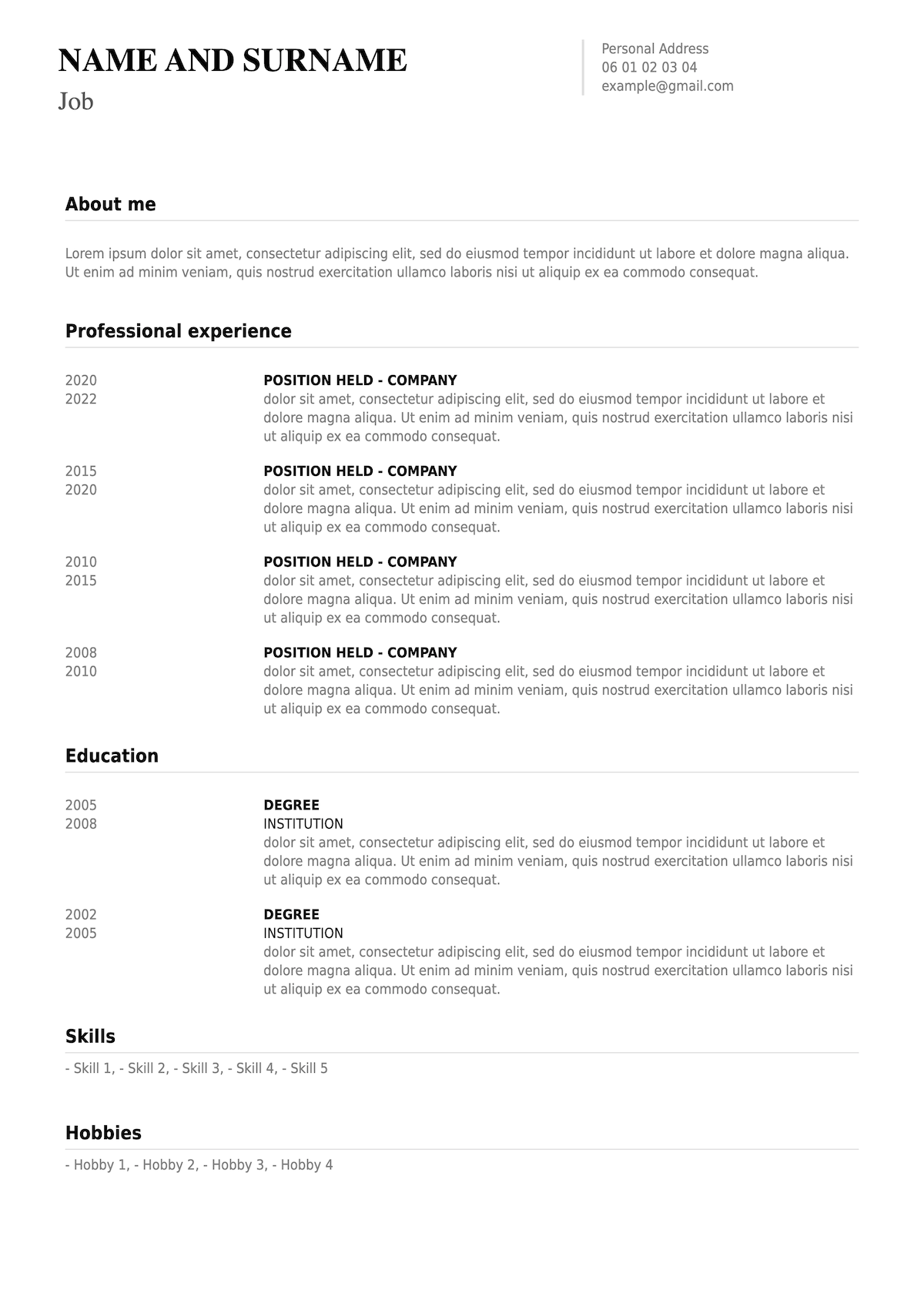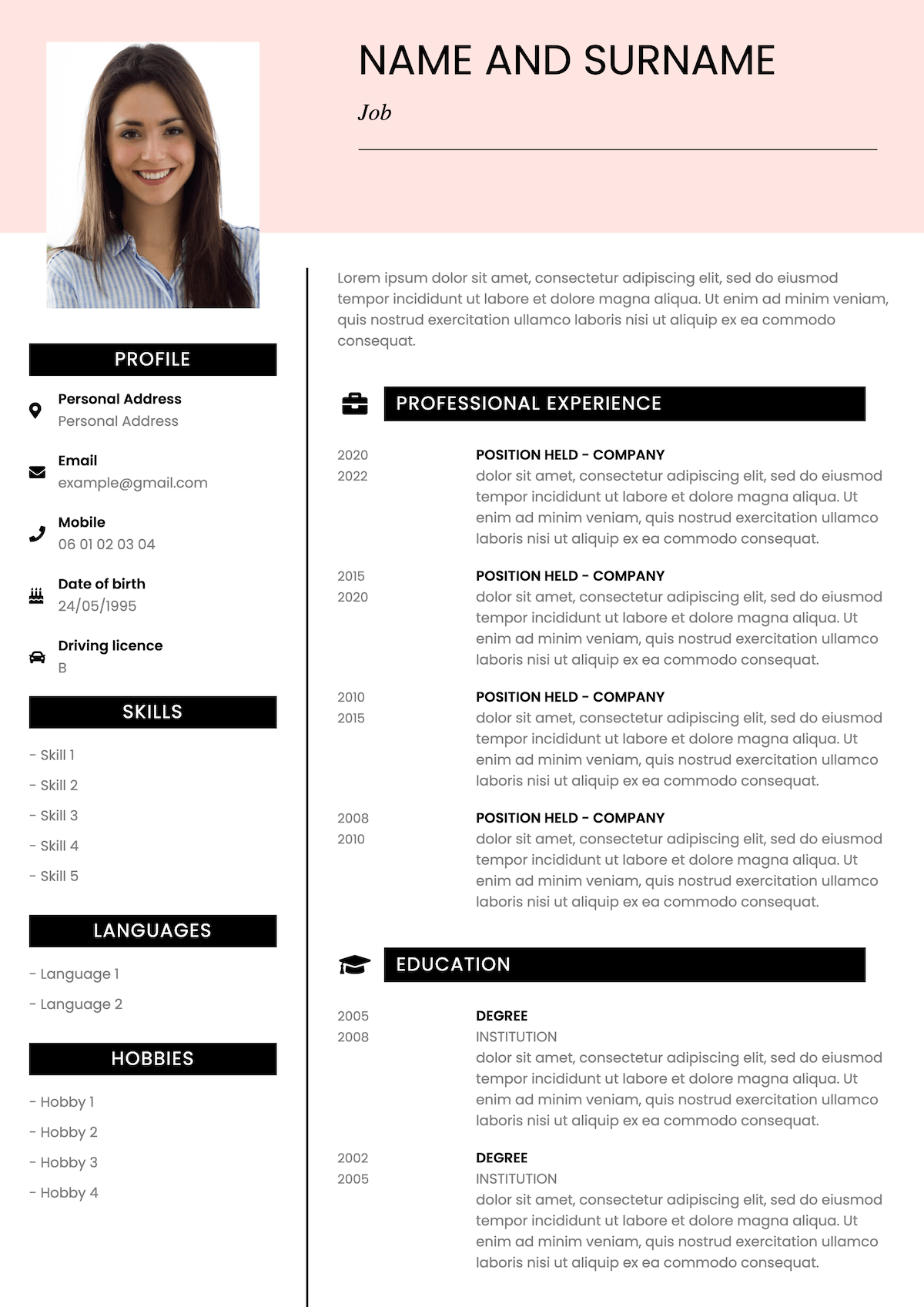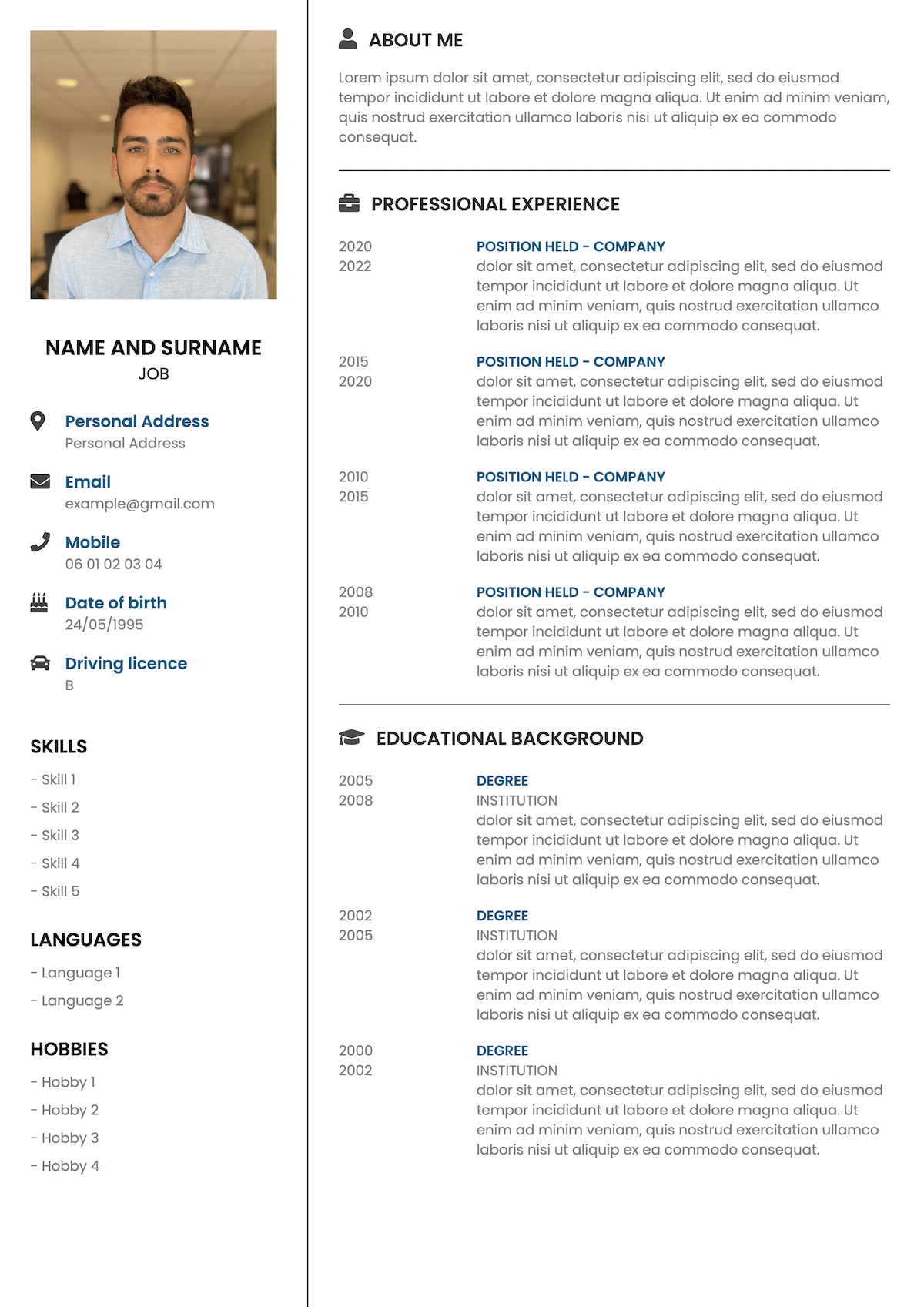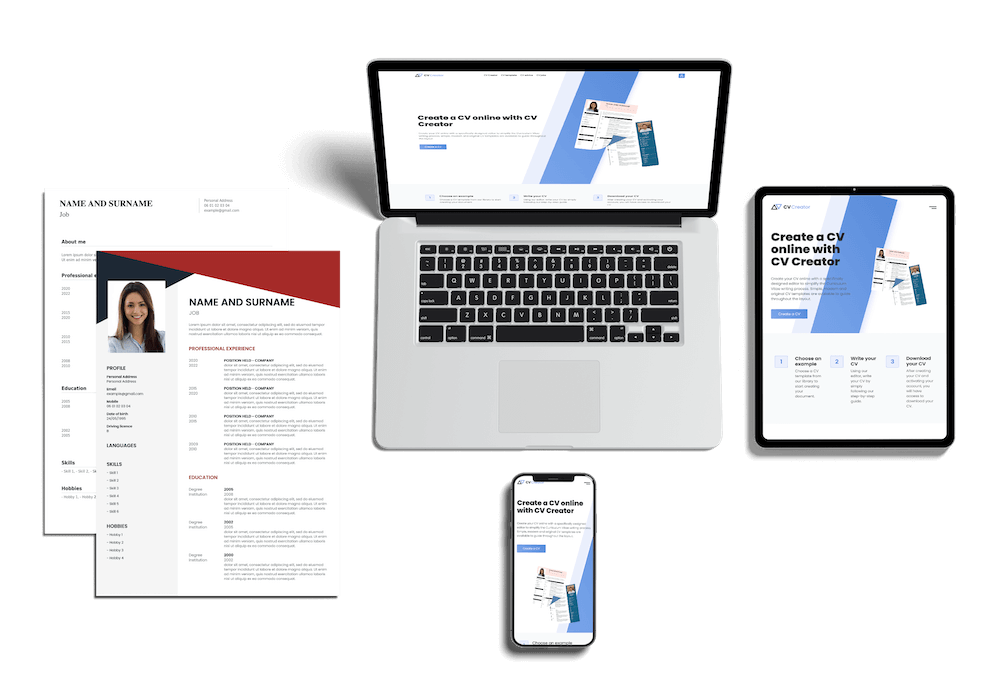German CV
So you are sure the time has come to move to Germany? Now comes the hard bit, finding work. As daunting as that may seem, according to the German Federal Employment Agency, 12% of the workforce in Germany is foreign. These are very good metrics for an expat.
Create your CV now
Choose a template CV and create your own online
Want to see more CV templates?
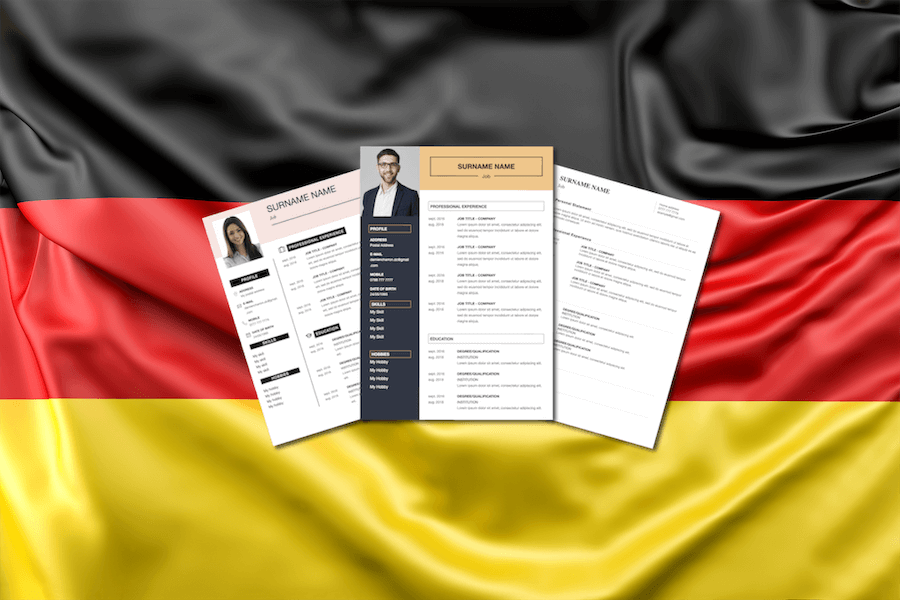
To find work, you will need to build a German CV template and Cover Letter. The direct translation of the CV in Germany is Lebenslauf. So, if you are looking for a German CV layout that will make German recruiters say Ja! in a heartbeat, you are in the right place! Here’s how.
This German CV template guide will show you how to:
- Structure your German CV.
- Use the right lexicon for the German employment market.
- German Cover Letter and Interview
In a rush to build your CV? Don’t have time to go through the entire blog and need a great CV in 5 minutes? Give our CV Creator a go. With more than 20 tailored CV’s to choose from, you will be spoilt for choice.
So if you are short of time, you can create your CV here.
German CV Structure
It is easy to conclude a German CV is just like a French CV or even an American CV. Alas, this is not the case. A simple translation of your CV will not be enough to impress a German recruiter.
A German CV (Lebenslauf) is seen as less of a marketing ploy and more a valid document. German headhunters apply the KISS process. Keep it short and simple. This means your CV should center on cold hard facts, not unreal ideas.
These are the main features of a German CV:
- Keep your CV factual and concise. Do not go wild.
- Limit your CV to one A4 page.
- Find equal qualifications for the German employment market.
- Write your CV in both German and English languages.
Contact Details – Kontaktdaten
The very least you should include in this segment of your CV is your full name and personal address. But, a German headhunter expects a few more details from you. Personal details for an expat can be a great edfe if used well.
These are the key features that must appear on your CV:
- First name and Surname: Depending on your origins, you may have more than one first name and surname. For example, Brasilians and Spanish expatriates are notorious for having very long names. This can create confusion for an employer. Only list your first name and surname. Eliminate all middle names from your application.
- Personal Address: If you are applying from abroad, the country should be listed. If you are already in Germany, ensure your address is correct.
- Phone Number: Provide a phone number only if it is german. Do not add a personal phone number if it requires an international dialling code. An employer is likely to contact in such a scenario.
- Nationality: If you are not a German national, stating your nationality will help employers know your visa status. With the introduction of Brexit, this may complicate your application.
- Email Address: Provide a professional email address.
- Short Profile: A small personal statement of 4-5 sentences stating your work experiences and aspirations. Demonstrate your viability for the role.
Work Experience – Arbeitserfahrung
Use a chronological CV approach to build your CV. Start with your most recent work experience and work your way backwards.
For each job description you like, you should do the following:
Job role title
- Company Name
- Country
- List employment dates : When you started and when you finished this role.
- Key Tasks and Achievements: List 4 main responsibilities you had to undertake every day. Remain factual throughout. Quantify achievements and results. The idea is to have tangible results which an employer can understand and analyse. Soft skills are not sufficient.
Pro tip: German recruiters become suspicious if there are work experience gaps in your CV. Make sure to mention why there is a gap on your CV.
Potential reasons can be:
- Volunteer Work
- Gap year abroad
- Unemployment
Education – Bildung
In this segment of the German CV layout, include all your academic degrees and achievements. Start with your most recent completed degree or qualification.
For each degree or certificate, list the following:
- Name of Course studied ( For example: Business Management or Betriebswirtschaft)
- Name of University
- Study Period
- Grade Achieved
Pro tip: Provide an equivalent grade for the German grading system. This will show the employer you have done your homework. It also increases your chance of success.
Skills – Könnerschaft
Utilise this segment to list all your hard skills which are relevant to the job specifications. The goal is not to list all your skills, irrelevant of whether they are needed.
The following skills should feature on your CV:
- Project Management skills: Running a home construction project from scratch to completion. Completed on time and under budget by 13.5%. In charge of 15 collaborators.
- Programming skills: Technical assistance for users of Crowdstrike software.
- Big Data Skills: SQL skills.
- Qualifications or Certificates outside of academic achievements.
Hobbies – Hobbies
One word used commonly by English and German speakers is hobby. Add any hobbies that can be relevant for the job you want. Keep in mind to add quantifiable facts and results to any of your hobbies. German employers will not settle for a simple passion or interest.
How to use right vocabulary on your CV
The german language is notorious for its difficulty to translate accurately certain feelings. A German employer will not go out of his way to understand your personal statement. Especially if it is not factual.
It is important to know the basic “work” related vocabulary. You can find it right here.
For example:
- Schwierige Fähigkeiten = Hard Skills
- Soziale Kompetenz = Soft Skills
Equivalent Educational Grades for German CV
Read a German job offer for the first time. You may feel confused. Every country has their own educational system and examination process. In Germany, every year, thousands of schoolchildren pass their Abitur or Hochschulzugangsberechtigung. This is the equivalent of the A-Levels for the United Kingdom.
For a German CV, it is important to include the equivalent qualification for exams you have passed in the United Kingdom.
For example: Bachelorabschluss means a Bachelor’s Degree (3 years of studies)
Here is the list of equivalent examinations:
- Hochschulzugangsberechtigung: Year 13 A-Levels. This exam is necessary to apply for university.
- Erfahrung: If you do not pass the Abitur, you can pass an Erfahrung. The equivalent in the UK is National Vocational Qualification.
- Fachhochschuldiplom : A certificate obtained after 2 years of additional studies. You can enter a professional job immediately after.HNC (Higher National Certificate) and HND (Higher National Diploma) are the United Kingdom equivalent.
- Lizentiatengrad : 3 years after completing the Abitur, equivalent to an Undergraduate or Bachelor Degree (BA and BSC)
- Magister: 5 years after completing the Abitur, equivalent to most Master’s degrees. Important to note, most master degrees in the UK last 1 year. In Germany, a Master’s degree lasts 2 years officially. However, most students may take up to 4 years to complete their magister.
- Doktorgrade: 7 years after completion of Abitur, equivalent to the Ph.D in the United Kingdom.
In terms of examination grading:
- 70+% (First Class Honours 1st) – Sehr Gut + (0.8)
- 60+% (Upper Second Class Honours 2:1) – Gut + (1.8)
- 50+% (Lower Second Class Honours 2:2)– Gut – (2.5)
- 40+% (Third Class Honours 3rd) – Befriedigend (3.0)
German Cover Letter Tips
For many countries, like the United Kingdom, a cover letter is an added bonus. There is no requirement unless specified by the recruiter.
In Germany, the Cover Letter or Anschreiben, is an important document. In fact, it may be even more important than your CV. Harris interactive carried out a survey which found 39% of employers would not look at an application without a cover letter.
Here is what to include in your German Cover letter:
- Insert your full name and address in the top right corner.
- Use only 1 one A4 page.
- Mention job reference in the top right corner.
- Ensure the wording is very formal. .
- Provide references.
Pro Tip: Add anlage, which means enclosed,below your signature at the bottom of the cover letter.It allows you to add your academic diplomas, qualifications and reference letters.
Key points for your German CV
When creating a German CV, keep the following in mind:
- Include only your hard skills in your CV. Soft skills are reserved for your Cover letter.
- Ensure you know the equivalent certificate for your qualifications and its grading.
- Check with a German native for spelling and grammatical errors.
- KISS Methodology: Keep it short and sweet.
That’s it. You are all ready to write a German CV and find a job. If you are still unsure how to create a German CV and require more help, please feel free to reach out by clicking here.

